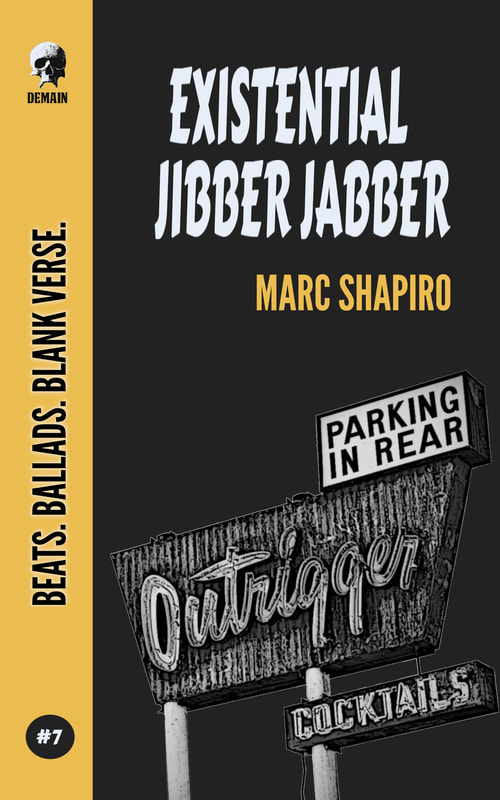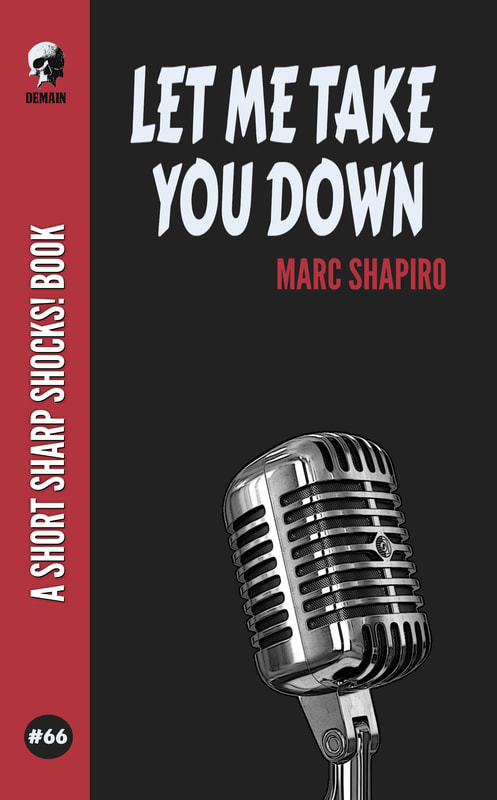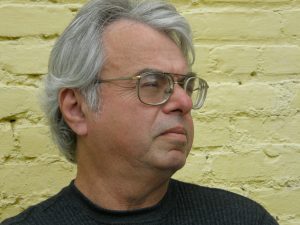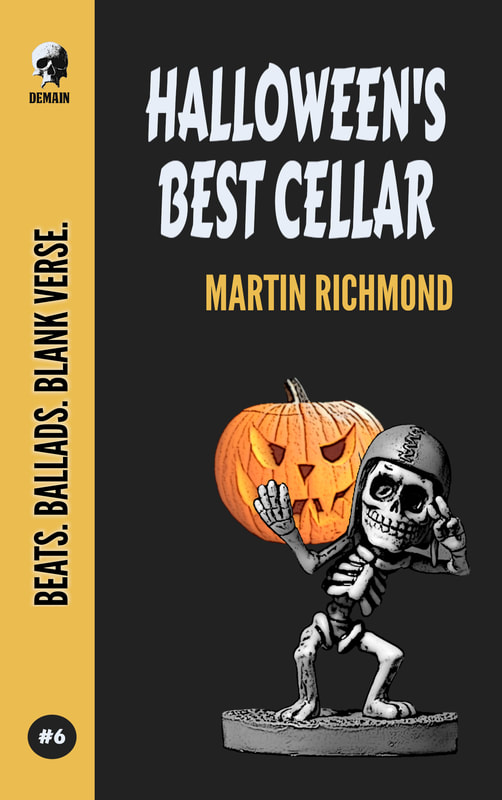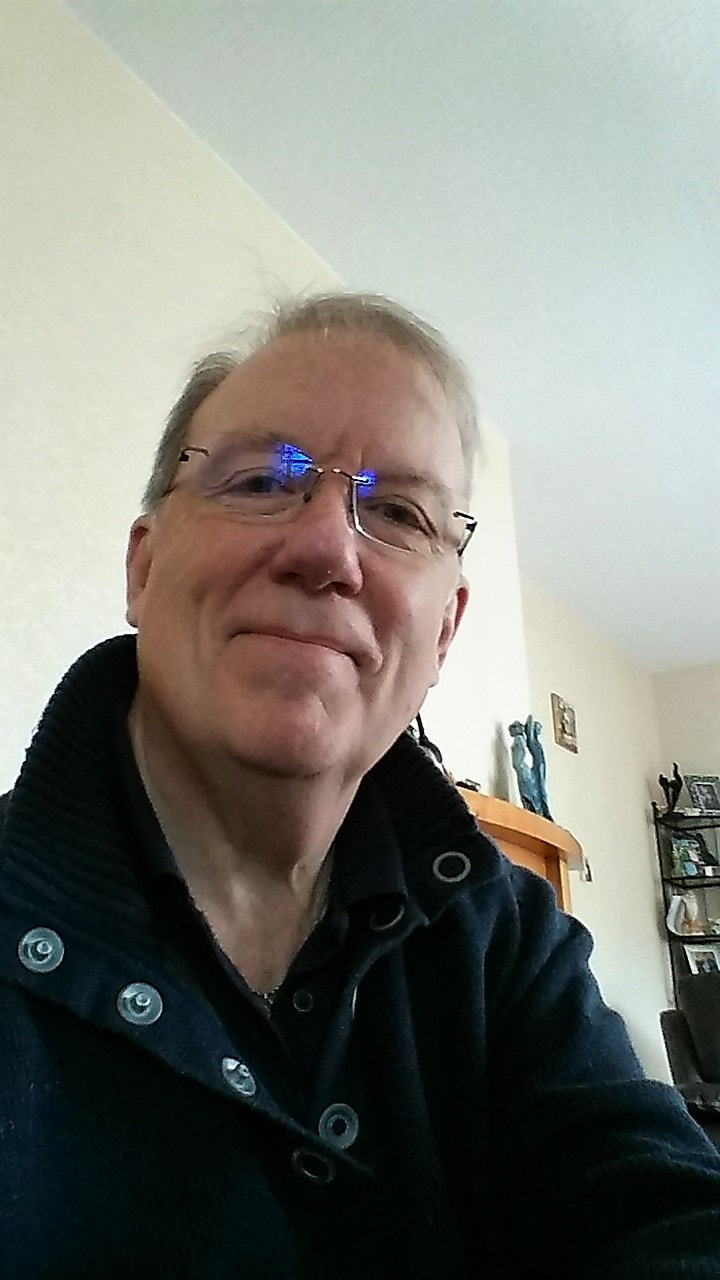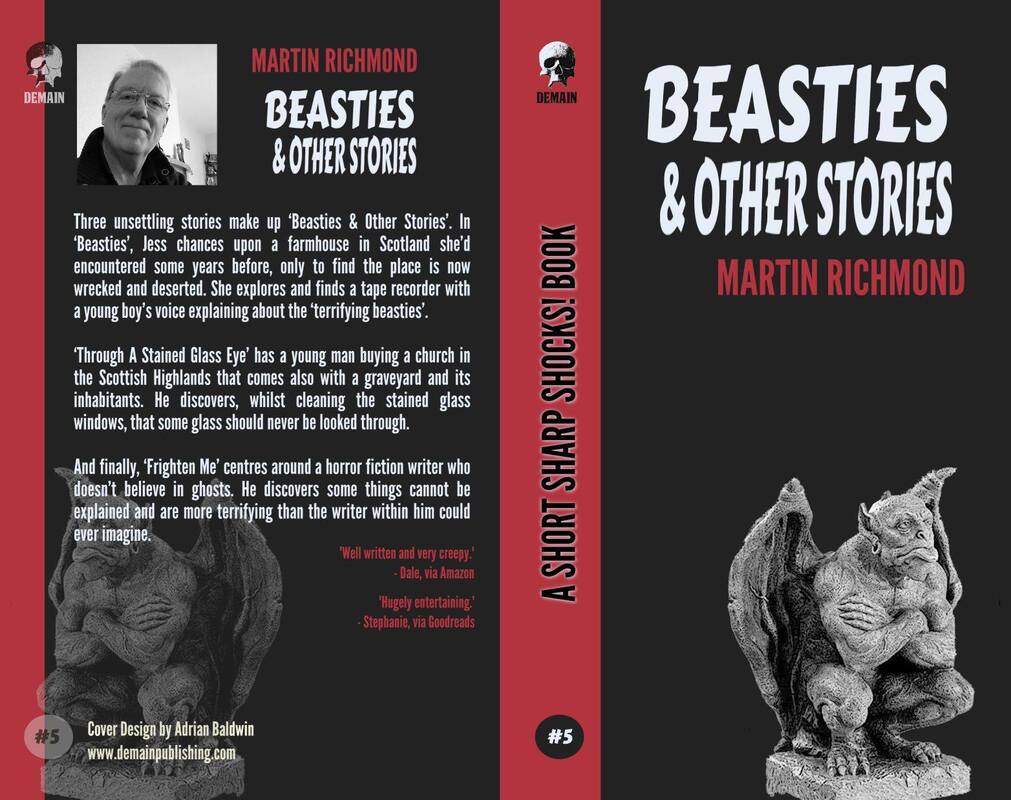|
|
|
Beats! Ballads! Blank Verse! Book 7 is Existential Jibber Jabber by Marc Shapiro. Marc has previously had published by DEMAIN a Short Sharp Shocks! Let Me Take You Down. It’s always a pleasure to work with Marc. His BBB! Is out on the 15th October (though currently available for pre-sales) and has a cover by Adrian Baldwin. Prior to publication Dean and Marc sat down and jabbered…
DEMAIN PUBLISHING: Great to see you again Marc, hope life is treating you okay at this still very odd time. So let’s get down to it. For those that don’t yet know you – do you come from a literary background? MARC SHAPIRO: Hi Dean. No. No. Blue collar, working class all the way. My parents read the newspapers and paperback novels but nothing real high end. DP: So did you read poetry as a child? MS: I was into horror and science fiction growing up but I did cross paths with Edgar Allan Poe on occasion. College opened the poetry world up to me. I took a class in English literature and got into the classic poets. I also joined a creative writing group whose instructor was big on the beats so I got a crash course in Ginsberg, Kerouac, Burroughs and Ferlinghetti. Latter Bukowski came along and I was hooked. DP: And what attracted you to poetry in particular? MS: The freedom of it all. The spontaneity of it all. The notion of making your points and getting out. If there were rules when I began writing poetry it was that there didn’t seem to be a whole lot of rules and that appealed to me. DP: I get that. Do you find writing poetry easy? MS: Easy or difficult, it depends on the poem. I’ve written poems in five minutes and I’ve written poems that have taken days to get them where I wanted them. If its an idea that hits me emotionally then it can take a while. Two examples are from this collection Existential Jibber Jabber. ‘Dances With Dangerous Women’ is autobiographical in nature and took a bit of work. ‘Time/Lost’ is 90 percent autobiographical and 10 percent artistic license. In a creative sense I sweated bullets on both of them because they hit close to home. DP: Two great poems there. With that last question in mind (and your answer obviously), does writing poetry energize or exhaust you? MS: It’s usually both at certain points in the process. Poems are quick and to the point. There’s a lot of sweat equity that goes into getting it right. Mentally getting poetry where you want it is a lot of hard work. When it’s done to your satisfaction, it feels like a job well done. DP: Definitely. When you write do you have to do much research? MS: My poetry tends to be of the moment, of the now. If its something observational, research is a matter of jogging my memory. I don’t think I’ve ever had to consult a reference book when writing a poem. DP: Nice – so how exactly do you begin writing a poem… MS: The same way I do when I write fiction. A hook. You’ve got to snag a reader with line one so they will be interested enough to read the rest. The same goes at the conclusion of a poem. You don’t want to be overwrought to the point of burying your reader. Just make your point and get out. Words to live by. DP: Makes sense. And how do your poems develop? Do you have a writing method? Do you show them to anyone as you draft? MS: You’ve got to love the nuts and bolts questions. My poems develop quite organically. An idea, a thought, a line and we’re off to the races. The closest thing I have to an actual writing method is that I tend to write the first draft of a poem in longhand. Then I take a look, add lines, take away lines and trim it all to its bare essence. Nobody sees my work until I’m satisfied with it or until it’s been published. Acceptance trumps opinion every time. For the longest period the only people who have seen any of my final drafts are my wife and a used bookstore owner friend of mine. In both cases anything they have to say is valid. My advice to writers of any persuasion is to not show your work to family members or long standing friends. There’s too much pressure on them to be nice and to not tell you what they really think. DP: Thanks. I’m quite interested in the ‘nuts and bolts’ of writing and what makes writers tick…okay, so, poetry – does it have a purpose do you think ? MS: It has a purpose to those who write it, those who read it and finally those who get something out of it. That may sound a bit abstract but the reality is that poetry can mean anything to anybody and that’s part of the allure. DP: Great answer! Let’s talk about your favourite poets. MS: Poe, Ginsberg, Bukowski, Di Prima, Kerouac, Burroughs are my go to poets when I’m in need of a creative shot for what ales me. Two poets known more for their music than their words are Patti Smith and Tom Waits. Maya Angelou and Amanda Gorman are powerful entries to my list. I’m sure there are countless others but these are the ones that come to mind. DP: Some great names there – as I’ve said elsewhere I’m a great admirer of Rimbaud who I know influenced Patti Smith and I totally love Tom Waits. You reading any poetry right now? MS: As in reading any of my poetry in a performance setting? I’ve done exactly one reading in my lifetime. 15 minutes at a book signing in Los Angeles for an anthology called ‘Duffus’. I think I passed muster. Nobody threw anything. Would I do it again? Sure. Make me an offer I can’t refuse. DP: We’ll see what we can come up with then. I’ve always wanted to go to Rimbaud’s home town – you ever gone on a poetry pilgrimage? MS: Never. But there’s a first time for everything. DP: There is! Are you a regular reader of poetry…I don’t read enough for sure… MS: I read poetry regularly but there never seems to be enough time in the day for the good stuff. DP: So true. Where you first get published? MS: The East Los Angeles Community College Literary Magazine. You could get a copy for 5 cents back in the day. The poem was called Treasure Diver. DP: Hahah love it! I guess from what you said earlier you love meeting your readers? MS: Absolutely. I’m a whore when it comes to getting out there. Anytime. Anyplace. Will answer any questions. Feel free to contact my publisher and he will pass your messages along to me. DP: What is your best experience as a writer… MS: Four weeks on the New York Times Bestseller List. Four weeks on the Los Angeles Times Bestseller List. Having one of my short stories appear along side a Charles Bukowski story in the anthology Sleeping With Snakes. Hooking up with DEMAIN PUBLISHING and getting my first poetry collection out there. DP: Thanks for the shout-out and well done. Couple more to go: do you think poetry can change the world? MS: Poetry is like any other creative form. It can inspire, educate, entertain and encourage people to go out there and do better than you. Change yourself and the world will most certainly follow. DP: True so can every poem mean something or can they just be enjoyed for the language and the word? MS: All of that. I’ve read poems that made me want to get out there and storm the battlements. I’ve read poems that made me want to say “Hey cool.” DP: And finally Marc…any advice to give aspiring poets? MS: Write. Read. Send your stuff out to magazines. Repeat. Trying to make a living as a poet is a hard hustle. But if writing poetry is your passion and you’d do it for free if you had another way to pay the bills…then poetry is your life. Jump on in. Great advice indeed! Thanks so much for your time Marc and all the best with your Beats! Ballads! Blank Verse! entry – Existential Jibber Jabber
0 Comments
It’s that time of the year, Halloween, again. And we welcome back to DEMAIN, Martin Richmond. This time around he’s created a poetry collection called Halloween’s Best Cellar (available now for pre-sales; cover by Adrian Baldwin) which will be published on Friday 15th October. As the lockdown restrictions were lifted, Dean and Martin sat down and talked about it…
DEMAIN PUBLISHING: Hello Martin! Hope you’re just fine and dandy. Okay, a little departure from your last Short Sharp Shocks! Beasties…but for those that don’t know you (yet, anyway!) do you come from a literary background? MARTIN RICHMOND: Hi! Great to be here. I have no literary background unless you count the couple of years I spent as restaurant critic for the Speakeasy magazine, a local council publication, and the time I spent as chairman of the ‘Falkirk Writers' Circle’. DP: And what poets did you like as a child? MR: My 'go to' poet as a child was always A.A. Milne, 'When we were very young' and 'Now we are Six' were always a comfort zone that I'd fall back on and read to my own children as well. Something I would recommend to all parents reading a bedtime story. The rhyming couplets stay in the memory. DP: They do. I’ve not actually read much Milne so will put that right asap. How did you get started as a poet and why poetry? MR: As a teenager I would create poetry fairly constantly, but always with a leaning towards the fantastic, horror or science fiction. Creating a collection that lead to most of my publications. DP: I’ve said in other interviews I did go through a three or so year period where I wrote nothing but poetry. Interesting that I’d never been interested in it before or since. Very odd. Anyway, do you find writing poetry easy? MR: With writing poetry I needed a theme or a specific subject matter to kick start the creative juices flowing. But once started, I have to finish it even if it leads to many, many re-writes until the tale is told. DP: So it energises you? MR: I feel quite energised with poetry and completing one is always greatly satisfying. DP: Oh I bet. Perhaps I need to pick up the pen and find the muse again. Do you have to do much in the way of research? MR: I do very little research writing poetry as I lean toward the fantastic and anything goes when it spills out so no research is ever needed. DP: Makes sense. So how do you start a poem (asking for a friend obviously haha)? MR: Kickstarting a new poem is probably the hardest part of the creation, knowing where to start can be a trial and error session until I get that hook to get it moving. DP: And how do you develop it? Do you show your work (at any stage) to friends/family? MR: Developing the poem once started can be very quick as I'm eager to get it down on paper before it escapes me. Scribbling on a notepad is far more creative than on a keyboard. The computer can wait. My daughter Aimi gets to see all my work and tells me what she thinks as she tends to live in the same literary world as I do and tells me honestly if it works - or not. DP: That’s cool and I’m like you, there’s a lot I do on paper first and then when I think it’s ready I stick it on the computer. I do love it when I have something finished in ‘hard copy’ first as it feels that something has been accomplished and is ‘real’. Do you think poetry has a purpose by the way? MR: Poetry can be very therapeutic. Some people tend to dismiss poetry as boring and don't consider the fact that most popular songs of any style are basically poetry set to music. That earworm you can't get rid of rattling incessantly round your head is a poem and it can get you through your day doing the most mundane of things with smile inside your head or on your lips. DP: I like that. I definitely think there are some amazing poems out there. I tend to lean towards French poets myself (particularly Rimbaud) and it’s a shame if any poet/poem is immediately dismissed as boring…so who are your favourite poets? MR: A.A. Milne is still a favourite poet, although the poems far outweigh the adventures of her little bear Pooh. I can guarantee at your lowest ebb, reading Milne's, 'Forgiven', or 'Waiting at the window' or 'The Four Friends' will put you into a far better place. But, a 'grown up' poem I always call to mind is 'Etiquette' by W S Gilbert of Gilbert and Sullivan, the opera writing duo. It tells of a time when social etiquette was always of prime importance, even when stranded on a desert island. DP: Oh wow, I don’t think I know that poem, so will have a read. Do you read poetry regularly (I know I certainly don’t read enough!)? MR: I refer back to poetry only occasionally, particularly if I need inspiration, probably because I can bring to mind most of the main ones that continuously hurtle round my inner universe, ready to dip into. DP: Poetry is hard to get published, tell us about your experience… MR: My first collection was The Trapdoor to Halloween, published in the USA in the Nineties. It is the inspiration for my book Halloween's Best Cellar, the only trick or treat book you'll need at Halloween and before the next Halloween. DP: I love it! Do you ever get out there with your poems and do readings / meet your readers? I certainly don’t do enough of that and of course it’s been damned difficult these last couple of years but perhaps in 2022… MR: When publicising my first book of poetry I was invited to give readings to several local groups and it was such great fun getting instant feedback from an audience immersed in your worlds and words. I once read a piece out that ended with, 'the show must', and paused for the next, obvious line to be spoken by another character, only to have the audience all say in chorus, 'go on!' A great feeling they were so wrapped up in it that they wanted to be part of it. DP: That’s brilliant! Is that your best poetry experience? MR: No.I once gave a copy of my book, The Trapdoor to Halloween to the great Scottish comedian, Billy Connolly, before his appearance at a gig in a local theatre and he commented on it in very glowing terms on stage, something I didn't expect, but love the man all the more for it. DP: Wow – that’s amazing! Well done! Okay: can poetry save the world? MR: Poetry saves the world in its own special way, giving hope and courage to pursue goals and achieve things that might make a difference. DP: That’s a great answer, thank you. What do you think about social media (or the internet as a whole when it comes to poetry)? MR: The juggernaut of the internet allows poetic words to travel much farther than was ever previously possible so it is a force for good in this instance, allowing the sharing of thoughts and deeds instantly, everywhere. DP: So true. Are you a member of any local poetry writing groups… MR: I used to share my work with a local writers’ group, The Falkirk Writers' Circle, where everyone was a poet and all genuinely wanted to hear what you had to say. Such an important stage in my writing life that I would urge others to join too and develop their own work. DP: I will thanks! Okay, last two now Martin. Should every poem mean something or can they just be ‘enjoyed’? MR: Poems don't always need to have a meaning or important message they can just be an enjoyable plunge into a word pool to make you laugh, cry or to just provide a small escape from a difficult world. DP: And finally – do you have any advice for an aspiring poet? MR: If someone should also wish to try their hand at writing poetry I would recommend reading as many poems as possible from different poets, to decide the style of poetry they feel most in tune with, then scribble some words down (on paper, not a computer) and read them out loud to yourself. Hearing them aloud tells you if they sound as good as you imagine they do on paper, then share them with a willing friend or relation to get feedback. If it's negative, accept it and keep trying, never give up, otherwise the world could be robbed of the next A A Milne if you do! Thanks for your time Martin – very much appreciated. All the best with your Beats! Ballads! Blank Verse! Halloween’s Best Cellar… |
CategoriesArchives
July 2024
AuthorDean M. Drinkel |
